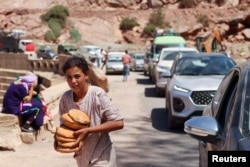This website uses cookies so that we can provide you with the best user experience possible. Cookie information is stored in your browser and performs functions such as recognising you when you return to our website and helping our team to understand which sections of the website you find most interesting and useful.

The death toll in Morocco has now risen to 2,900 after a 6.8-magnitude earthquake shook the High Atlas Mountains southwest of Marrakech on Friday. More than 5,500 people have reported injuries, more than twice the previous tally. Many survivors complain of a lack of aid from Morocco's government.
This earthquake is the North African nation's worst in more than 60 years.
After four nights exposed to the elements, locals who have been left homeless are frustrated with the emergency response.
Mehdi Ait Bouyali, 24, has been stranded along the Tizi N'Test, a lengthy road that connects Marrakech to outlying rural valleys. In the aftermath, he has been camping on the roadside with others who escaped.
They have received no government support and say if not for food and blankets from strangers driving by, they would have nothing.
"The villages of the valley have been forgotten," he said. "We need any kind of help. We need tents."
Government spokesman Mustapha Baitas on Monday disputed the accusations of inaction.
"From the first seconds this devastating earthquake occurred, and in following the instructions of His Royal Majesty, all civil and military authorities and medical staff, military and civil, have worked on the swift and effective intervention to rescue the victims and recover the bodies of the martyrs," he said.
Rescue teams, including some brought in from Qatar, the United Arab Emirates, Britain and Spain, have built tent camps and have begun to deliver food and water where they can.
But the situation is desperate for those in remote areas, where access routes have been obstructed by landslides, and where many live in old-style mud brick huts that have collapsed on their occupants.
Hamid Ait Bouyali, 40, who was camping with Medhi on the side of the road, described the devastation.
"The authorities are focusing on the bigger communities and not the remote villages that are worst affected," he said. "There are some villages that still have the dead buried under the rubble."
Everyday, citizens have been aiding in the response. Brahim Daldali, 36, of Marrakech, has been delivering vital supplies on his motorcycle to those hit the hardest.
"They have nothing, and the people are starving," he said.
All of the residents in the village of Kettou were miraculously spared, as they were participating in an outdoor pre-wedding celebration. Meanwhile, their stone and mud brick houses were razed by the earthquake.
Some parts of Marrakech's old city were damaged, but most of the city emerged unharmed, including buildings where the International Monetary Fund and the World Bank are scheduled to hold meetings in October. The government is reluctant to reschedule.
Some information from Reuters was used in this report.



 Africana55 Radio
Africana55 Radio 

